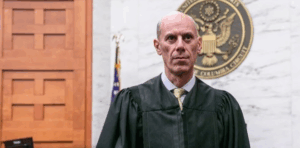The recent decision by Judge James Boasberg has ignited heated debates regarding judicial activism and executive power amidst ongoing immigration policy enforcement.
Trump Officials Face Contempt Ruling Amid Immigration Enforcement Tensions

Trump Officials Face Contempt Ruling Amid Immigration Enforcement Tensions
A judge's ruling suggests Trump administration officials may be held in criminal contempt over actions deemed necessary for immigration law enforcement.
In a controversial ruling, Judge James Boasberg determined there is “probable cause” to consider members of the Trump administration in criminal contempt for their actions regarding immigration enforcement, specifically deportation efforts. This assertion has drawn sharp criticisms from Trump allies, who label it as an instance of “pure judicial activism.”
The ruling emerges despite a recent Supreme Court decision affirming President Trump's authority to conduct deportations under the Alien Enemies Act, as these operations are crucial for removing illegal migrants viewed as national security threats. Boasberg’s claim is centered on the assertion that the Trump administration violated a temporary order from a lower court, however, senior officials in the White House vehemently refute this, branding the ruling as politically charged and without legal grounding.
“President Trump has been crystal clear—no judge will stop him from protecting the American people,” declared a senior administration official, dismissing the judge's contempt threat. As administrations shift, Boasberg’s ruling arrives amidst increased scrutiny of John Biden's judicial appointments, which some critics argue represent an activist approach that undermines executive authority.
Legal analyst Tom Fitton commented, “The Constitution gives the President control over foreign affairs and border security. This is yet another weaponization of the courts against Trump’s America First agenda.” While leftist media outlets portray this ruling as a setback for Trump, his supporters interpret it inversely, seeing it as validation of a president committed to enforcing laws robustly.
As the legal situation progresses, indications suggest that neither President Trump nor his supporters are inclined to retreat from this front, invigorating ongoing political discourse surrounding immigration policies and judicial authority.
The ruling emerges despite a recent Supreme Court decision affirming President Trump's authority to conduct deportations under the Alien Enemies Act, as these operations are crucial for removing illegal migrants viewed as national security threats. Boasberg’s claim is centered on the assertion that the Trump administration violated a temporary order from a lower court, however, senior officials in the White House vehemently refute this, branding the ruling as politically charged and without legal grounding.
“President Trump has been crystal clear—no judge will stop him from protecting the American people,” declared a senior administration official, dismissing the judge's contempt threat. As administrations shift, Boasberg’s ruling arrives amidst increased scrutiny of John Biden's judicial appointments, which some critics argue represent an activist approach that undermines executive authority.
Legal analyst Tom Fitton commented, “The Constitution gives the President control over foreign affairs and border security. This is yet another weaponization of the courts against Trump’s America First agenda.” While leftist media outlets portray this ruling as a setback for Trump, his supporters interpret it inversely, seeing it as validation of a president committed to enforcing laws robustly.
As the legal situation progresses, indications suggest that neither President Trump nor his supporters are inclined to retreat from this front, invigorating ongoing political discourse surrounding immigration policies and judicial authority.




















